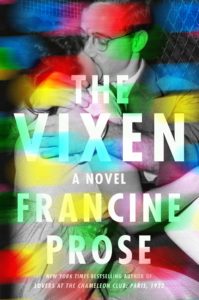Quirky Novels
November 30, 2021 in Library Corner
By Robin Jacobson.
Two new novels, Antiquities by Cynthia Ozick and The Vixen by Francine Prose, are well worth reading, even if they leave you shaking your head. Antiquities is a charming comedy-drama, but it is hard to make sense of it. In contrast, Vixen is easy to understand, but the novel is an eclectic mash-up of genres and styles: a coming-of-age story, historical novel, mystery thriller, and parody of the 1950s publishing industry.
Antiquities
 Antiquities begins in 1949 at the Temple Academy, a former boys’ boarding school in New York’s Westchester County. Closed since 1915, the school has been repurposed as a retirement home for its trustees. The narrator, Lloyd Wilkinson Petrie, is one of seven remaining trustees residing there. Something of an “antiquity” himself, Petrie is an elderly retired lawyer who is proud of his WASP blueblood pedigree.
Antiquities begins in 1949 at the Temple Academy, a former boys’ boarding school in New York’s Westchester County. Closed since 1915, the school has been repurposed as a retirement home for its trustees. The narrator, Lloyd Wilkinson Petrie, is one of seven remaining trustees residing there. Something of an “antiquity” himself, Petrie is an elderly retired lawyer who is proud of his WASP blueblood pedigree.
The novel records, in diary form, Petrie’s struggles to write a remembrance of his student days. He also reflects on his present life, including his trying interactions with the other residents of Temple Academy. One grumpy retiree even dumps a bottle of ink on Petrie’s typewriter to prevent him from typing late at night.
Petrie’s school remembrances center on his intense friendship with a fellow student named Ben-Zion Elefantin. This mysterious lad claimed to be a descendant of ancient Jews who lived on Egypt’s Elephantine Island and built their own Temple. The young Petrie felt an immediate bond with Elefantin, partly because Petrie’s most precious possession is a trove of ancient Egyptian artifacts that belonged to his late father. Petrie’s father had volunteered at the excavation of the Great Pyramid of Giza, a project directed by a renowned archaeologist cousin, William Matthew Flinders Petrie (an actual historic figure).
Being both Jewish and eccentric, Elefantin is a social outcast at Temple Academy. By befriending him, Petrie becomes an outcast too. Not that Petrie is a philosemite. To the contrary, his diary is rife with casual antisemitic comments. He opines, for instance, that President Roosevelt dragged the United States into war for the sake of the Jews.
In an interview, Ozick said that she scattered “clues” within Antiquities about its meaning. The defunct school is called “Temple” – maybe a nod to the ancient Temples in Jerusalem and on Elephantine Island? Elefantin rails against false idols – does Petrie worship modern false idols? Most intriguingly, Ozick says that Petrie’s realization that the “most significant thing” is “not in the heavens” is a reference to Deut. 30:11-14. These verses declare that humans must interpret divine commands. A fascinating book to read and ponder.
The Vixen
 The Vixen opens in 1953, on the night of Ethel and Julius Rosenberg’s execution as Soviet spies. Simon Putnam, newly graduated from Harvard, is at home with his parents in Coney Island watching the grim TV coverage. As Jews, the Putnams are sympathetic to the Rosenbergs’ plight (Simon’s mother grew up with Ethel) and infuriated by Senator McCarthy’s “Red Scare” campaign to ferret out and denounce supposed communists.
The Vixen opens in 1953, on the night of Ethel and Julius Rosenberg’s execution as Soviet spies. Simon Putnam, newly graduated from Harvard, is at home with his parents in Coney Island watching the grim TV coverage. As Jews, the Putnams are sympathetic to the Rosenbergs’ plight (Simon’s mother grew up with Ethel) and infuriated by Senator McCarthy’s “Red Scare” campaign to ferret out and denounce supposed communists.
Simon lands a plum entry-level job at a distinguished publishing house. To his dismay, he is assigned the task of editing a salacious, outrageously awful potboiler – The Vixen, the Patriot, and the Fanatic – that vilifies Ethel Rosenberg as an evil, sex-crazed, communist spy. The founding partner confides to Simon that the firm desperately needs a bestseller, even if this trashy novel is not their usual highbrow fare. Simon soon realizes that something more sinister and dangerous is afoot. Awash in moral dilemmas and terrified of being labeled a communist sympathizer, Simon embarks on a perilous course to unravel the manuscript’s true origins and purpose.